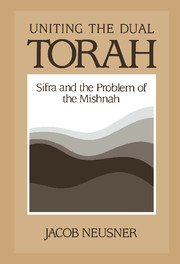Book contents
- Frontmatter
- Contents
- Preface
- Prologue
- 1 The Problem of the Mishnah
- 2 Torah as a Common Noun: The Solution of the Talmuds
- 3 A Sample of Sifra
- 4 From Common Noun to Proper Noun: Sifra's Re-presentation of the Two Torahs as One
- 5 Sifra's Alternative to the Mishnah's Topical Program and Its Order
- 6 Sifra's Alternative to the Mishnah's Logic of Cogent Discourse
- 7 Sifra's Alternative to the Mishnah's Proof of Propositions through Taxonomic Classification and Hierarchization
- 8 Re-presenting the Torah: Sifra's Rehabilitation of Taxonomic Logic
- 9 Torah as Proper Noun and the Structure of the Logic of Creation
- Appendix: The Distinctive Character of Sifra among Midrash Compilations
- Bibliography
- Index
6 - Sifra's Alternative to the Mishnah's Logic of Cogent Discourse
Published online by Cambridge University Press: 06 July 2010
- Frontmatter
- Contents
- Preface
- Prologue
- 1 The Problem of the Mishnah
- 2 Torah as a Common Noun: The Solution of the Talmuds
- 3 A Sample of Sifra
- 4 From Common Noun to Proper Noun: Sifra's Re-presentation of the Two Torahs as One
- 5 Sifra's Alternative to the Mishnah's Topical Program and Its Order
- 6 Sifra's Alternative to the Mishnah's Logic of Cogent Discourse
- 7 Sifra's Alternative to the Mishnah's Proof of Propositions through Taxonomic Classification and Hierarchization
- 8 Re-presenting the Torah: Sifra's Rehabilitation of Taxonomic Logic
- 9 Torah as Proper Noun and the Structure of the Logic of Creation
- Appendix: The Distinctive Character of Sifra among Midrash Compilations
- Bibliography
- Index
Summary
An authorship identifies a principle of association that joins one topic to another, and that does so in one way, rather than another. I call this the logic of cogent discourse, in that the chosen logic joins one sentence or proposition to another sentence or proposition.
The Four Logics of Cogent Discourse in the Canon of the Dual Torah
The logic of cogent discourse explains how an authorship joins one sentence to another and groups of sentences together into cogent statements (e.g., paragraphs, propositions). That is to say, I ask about the way in which people add up two and two to make four. In cogent discourse there is always the appeal to the and, and to the equal, which is to say, the conclusion yielded by the and. There are four ways in which an authorship in the canon of the dual Torah may join one sentence to another. One is familiar to us as philosophical logic. Philosophical discourse is built out of propositions and arguments from facts and reason. The second is equally familiar as what I call teleological logic, namely, cogent discourse attained through narrative. These two are logics of a propositional order. The third logic is not propositional, and, as a matter of fact, also is not ordinarily familiar to us at all. It is a mode of joining two or more statements – sentences – not on the foundation of meaning or sense or proposition but on foundations of a different order altogether.
- Type
- Chapter
- Information
- Uniting the Dual TorahSifra and the Problem of the Mishnah, pp. 107 - 124Publisher: Cambridge University PressPrint publication year: 1990



